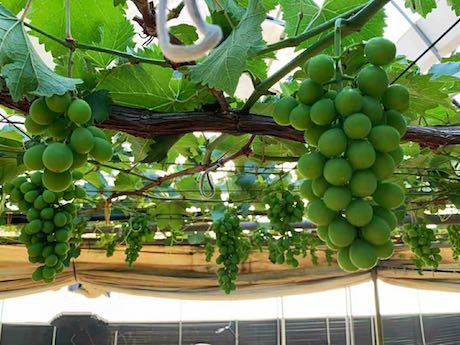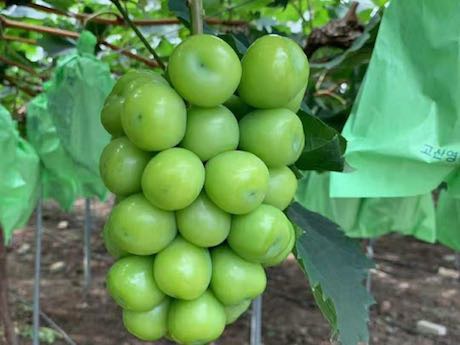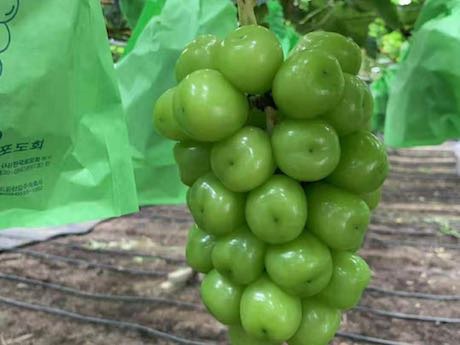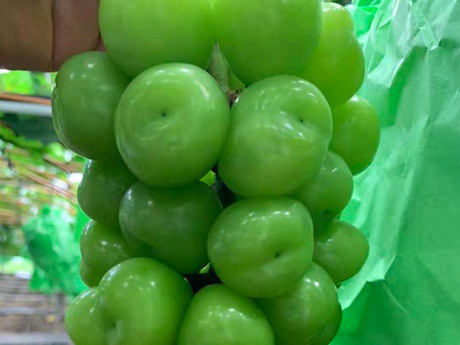After the cherry craze, China is now gripped by Shine muscat grapes. This seedless grape variety has big and full berries, a bright green color, a fresh and sweet taste, and is suitable for consumers of all ages. However, their prices are somewhat formidable: products imported from Japan with extremely high quality can fetch prices as high as 700-800 yuan/bunch, and they are rare on the market.

Korean shine muscat grapes
Locally produced muscat grapes mainly come from Yunnan. This variety has only been introduced into China for less than 3 years. Prices vary with grades. The highest grade can be sold for about 200 yuan per kilogram while lower ones can be sold for 100 yuan/kg. In the meantime, shine muscats from South Korea are also quietly entering the Chinese market. The quality is excellent and the price is somewhere between that of the products from Japan and China, about 500 yuan/kg. They are sold both online and offline, more commonly than the Japanese counterparts, and are very popular.

Korean Shine muscat grapes
The Shine muscat grape was bred in 1988 by the Uehara Grape Research Institute in Japan by crossbreeding a few varieties. Due to high prices and profits, more and more farmers in China have switched to this variety, but they are still at the exploration stage, lacking the growing techniques and experience. There are very few people in China able to achieve the quality of the highest grade and the first grade. Within this context, products imported from South Korea have become a very cost-effective choice. Because of the more mature techniques used, their limited production, as well as import taxes and fees, the sales price of the Korean products is about twice as high as the local products.

Korean Shine muscat grapes
According to the latest customs policy, table grapes are the only South Korea item allowed in the China market. Due to the limited availability of high-quality Shine muscats produced in China, the popularity of these grapes soared. It is expected that their value will increase rapidly in the next few years.
There are three main varieties exported from South Korea: Shine muscat, kyoho, and campbell early, among which Shine muscat is the main export variety, and China is the country’s main export destination. In addition, according to the South Korean media, on the morning of August 19, Shenzhen Yiigoo Agricultural Products Co., Ltd. and South Korea SG International held a signing ceremony. In this agreement, SG promises to export 1,200 tons of Shine muscat grapes worth 1,200 million yuan to China in the next five years.

Korean shine muscat grapes
The two parties will jointly launch a Chinese brand “Uni-wine” with the Chinese name “壹藤匠” for shine muscats, and launch exclusive design packaging. It is reported that the production of shine muscats in South Korea is limited, so Yiigoo will supply mid- to high-end markets in first- and second-tier cities, with footholds in Beijing, Shanghai, Guangzhou, and Shenzhen. In addition to traditional wholesale and boutique supermarkets, the company will also supply large online retailers.
Mr. Zhao has many years of experience in overseas procurement and trade. According to him, South Korea has been growing shine muscats since 2005. The main production areas in this country are Sangju-si and Cheonan. Shine muscat grapes from South Korea enjoy a long supply period thanks to the crisp and full berries that don’t easily fall off of the stems, good storage and transportation ability, and advanced packaging and refrigeration technology, which can last from the end of July to January of the following year. Meanwhile the local products generally leave the market in October. The introduction of these grapes from South Korean can fill this market gap very nicely.
More info:
Contact: Mr. He - Manager
Company: Shenzhen Yiigoo Agricultural Products Co., Ltd.
Mobile: +86 136 9186 0914
Email: deck@onefruit.net
WeChat: deckmond
